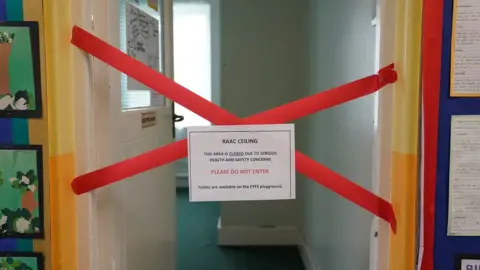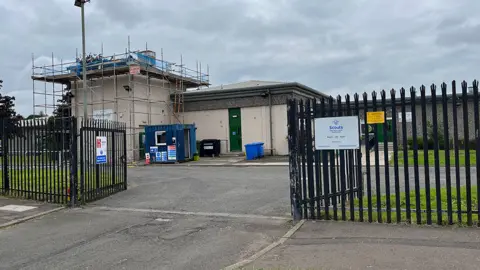Which schools in Scotland have RAAC and why haven't they closed?
 PA Media
PA MediaQuestions have been raised about the safety of some school buildings in Scotland after it emerged that 40 have been found to contain potentially dangerous concrete.
In England, more than 100 schools were told to shut buildings with reinforced autoclaved aerated concrete (RAAC) days before the start of term.
It led to a scramble to find alternative temporary classrooms, with some schools reintroducing online learning, amid fears the concrete could collapse.
In Scotland, some school buildings containing the material are also closed but others remain open and are checked regularly.
First Minister Humza Yousaf has insisted appropriate safety measures are in place in Scottish schools and there is no immediate risk to pupils or staff.
Which Scottish schools have RAAC in Scotland?
RAAC has been described by one expert as "like a concrete Aero bar" and was used in construction between the 1950s and 1990s.
It has also been found in NHS buildings, including some hospitals, universities, colleges and other public sector buildings.
But it can fail if water gets into the material, causing the internal metal structure to rust.
The Scottish government has not published a full list of the schools found to have RAAC.
However BBC Scotland News has had it confirmed that the building material has been found in the following schools:
- Charleston Academy, Inverness
- Nairn Academy
- Perth Grammar School
- Balbardie Primary School, Bathgate
- Riverside Primary, Livingston
- Windyknowe Primary, Bathgate
- Knightsridge Primary, Livingston
- St Kentigern's Academy, Blackburn
- Forres Academy, Moray
- Preston Lodge High School, Prestonpans
- Ross High School, Tranent
- Lorne Primary School, Leith
- Cramond Primary School, Edinburgh
- Trinity Primary School, Edinburgh
- Pentland Primary School, Edinburgh
- Fox Covert Primary School and St Andrews Fox Covert RC Primary School, Edinburgh
- Colinton Primary School, Edinburgh
- Currie High School, Edinburgh
- Trinity Academy, Edinburgh (swimming pool which has been closed since 2014)
- Laurieknowe Primary School, Dumfries
- Dumfries Academy
- Carrutherstown Primary, Dumfries and Galloway
- Gatehouse Primary, Dumfries and Galloway
- Abbotswell Primary, Aberdeen
- Cornhill Primary, Aberdeen
- Hazlehead Academy, Aberdeen
- Northfield Academy, Aberdeen
- Quarryhill Primary School, Aberdeen
- St Machar Academy, Aberdeen
- Westpark School, Aberdeen
- Mackie Academy, Stonehaven
- Westhill Academy, Aberdeenshire
- Ardrossan Academy
- John Logie Baird Primary, Helensburgh
- Whitehill Secondary, Glasgow
- Ardler Primary School, Dundee
- St Fergus RC Primary School Dundee
- Crosshouse Early Childhood Centre, East Ayrshire
- Ravenswood Primary School, Cumbernauld
- St Michael's Primary, Port Glasgow
What mitigation measures have been taken?
In some schools where RAAC has been detected, the decision has been taken simply to monitor the situation or to conduct further investigations in the October holidays.
Remedial action has already been taken at some schools, like Ravenswood Primary in Cumbernauld, where permanent steel supports have been fitted.
In others - where the building material has been found to be at risk of failure - classrooms have been closed and pupils decanted to alternative buildings.

Last November Knightsridge Primary School in Livingston was closed and pupils were relocated to neighbouring schools following concerns about its roof.
It will cost West Lothian Council £6.7m to replace all the RAAC panels in the school.
The youngest pupils (P1-3) returned to the school building in August but the oldest children (P6-7) will be educated off-site until March next year.
Riverside Primary, also in Livingston, is closed to all pupils, with children relocated to the nearby former Bealtie School.
West Lothian Council has bid for funding from the Scottish government to replace Riverside school.
Meanwhile parts of St Kentigern's Academy in Blackburn are out of bounds to pupils and staff, and a plan to remedy the issue by constructing a new wing is estimated to cost up to £35m
At Perth Grammar School, where RAAC was found in February, panels have been removed and replaced with a steel profile roof over the summer holiday.
Preston Lodge High School in Prestonpans, East Lothian, is also among the schools which have been harder hit.
Parts of the building were closed following the discovering of RAAC last term, meaning some lessons are taking place in alternative venues within the school's catchment area.

And pupils at two Edinburgh primary schools - Cramond and Trinity - have moved into temporary classrooms while investigation and remedial work is carried out.
A wall containing RAAC has also had to be secured at the MoD's private Queen Victoria School in Dunblane.
However, in North Ayrshire structural engineers confirmed there were "no immediate safety concerns" relating to RAAC found in a PE block at Ardrossan Academy.
They added that "in light of events elsewhere in the UK" they were restricting access to the building pending a further inspection.
Meanwhile Glasgow City Council said RAAC was discovered in Whitehill Secondary in 2021 but detailed inspections have shown no evidence of defects.
As a precaution, remedial work has taken place to provide an alternative means of support for air conditioning units.
When did the Scottish government know about the problems with RAAC?
The first minister told BBC Scotland News the issue was raised "a few months ago".
However, there is evidence to suggest that the potential dangers associated with RAAC have been known about for several years.
A report in The Scotsman says the Scottish Fire and Rescue Service warned that buildings were under threat of collapse due to RAAC more than two years ago.
Councillors at West Lothian Council also flagged their concerns after being left with a multi-million pound repair bill to fix buildings including schools and community centres.
Meanwhile, Michael Kilpatrick, former chairman of the Institution of Structural Engineers, told BBC Scotland's The Nine that RAAC checks had been carried out on schools since 2018.
But he said widespread closures of schools north of the border were unlikely.
"The number of buildings which do have these panels is quite small in relation to the overall building stock and the number of buildings that do have an issue are small percentage of them," he said.
Mr Kilpatrick said that where the panels were found, they should be monitored, the areas closed and replacement of the panels planned.
Why aren't more schools being closed like in England?
The decision to close schools in England followed the unexpected collapse of a beam, previously considered low risk, during the summer holidays.
It led to all schools with RAAC being labelled as potentially dangerous and being closed or partially closed at short notice.
The Scottish government says it has asked for clarity on any new "reports, assessments or third-party advice" which has led to the change in approach in England.
The information was requested from the UK's Secretary of State for Education, Gillian Keegan, on Sunday.
"Thus far, no reply to this letter has been received," a spokesperson added.
A UK government source said the Department for Education had been working with the devolved nations on the issue for several years.
They added that Ms Keegan had written to her counterparts in Scotland and Wales to share best practice.
When Mr Yousaf was directly asked why Scotland was not following England in closing more schools, he insisted there was no immediate risk to staff or pupils.
"Of course we'll continue to monitor the sites that do have RAAC but we know for example that appropriate mitigations are being put in place," he told BBC Scotland News.
"Parents shouldn't worry - I know as a parent myself who's got children in school - when you see what's happening down south in England, there may be some concern, but there's no need for alarm.
"It is a serious situation but it's one both national and local government are working closely together on."
